Established in the northern port city of Keelung 21 years ago, Happy Family Seafood Restaurant is famous for its fresh seafood cuisine. The restaurant chain now has nine branches in northern Taiwan. On a recent weekend, my family visited the Xindian branch (新店店), which is a 5-minute walk from Dapinglin MRT Station (大坪林站).
Arriving at noon, the restaurant was over three-quarters full, yet we were quickly seated at a large round table that was big enough for 10 guests, although there were only six of us. It then became apparent that there are no small tables, so plan to go with a large dining party.
On weekends, the restaurant offers a "combination menu" (合菜, NT$1,200 to NT$10,500), of which there are 10 combinations to choose from. Each includes six to 11 dishes, soup or congee and fruit. The more expensive combinations include high-end items such as sea cucumber and king crab. We went with the NT$3,000 meal, ideal for a party of five to seven.
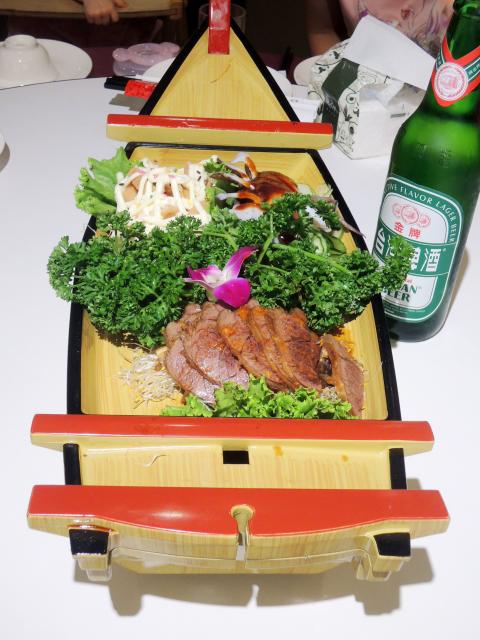
Photo: Eddy Chang, Taipei Times
The appetizers included oil-braised bamboo shoots and stir-fried freshwater clams. The clams were cooked with large slices of ginger and were particularly flavorsome. For the slightly boiled chicken, the chicken chunks were not too dry thanks to the oily- and firmly-textured skin. For the starter, we chose one dish from three options: lobster salad, steamed lobster or fish medley. We chose the salad, the succulent lobster nesting on a bed of alfalfa and accompanied with a mayonnaise that was a little too sweet.
The “three-style cold dish” (三色拼盤) — abalone, octopus and braised beef — came luxuriously served on a model boat garnished with parsley, cucumber slices and alfalfa sprouts. The abalone and octopus were slightly boiled, so I could still taste the sweetness.
The minced shrimp in lettuce came next. The famous dish was originally developed by 95-year-old master chef Peng Chang-gui (彭長貴). For this dish, you wrap minced shrimp cooked with crushed “deep-fried twisted dough sticks” in large slices of lettuce. Surprisingly, the chef used deep-fried minced shrimp rather than the more commonly used stir-fried minced shrimp, resulting in a dish that was over-cooked.
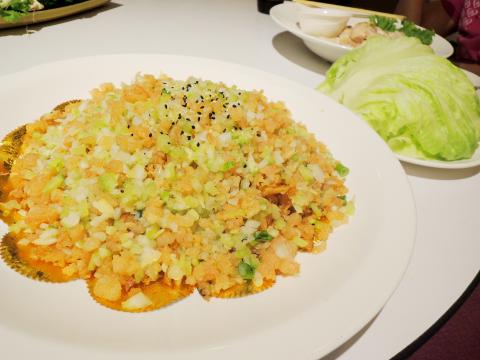
Photo: Eddy Chang, Taipei Times
The meal ended with glutinous rice with shrimp, squid and steamed fish. The rice was cooked with pork cubes, chopped mushrooms and fried shallots, lending it a complex and savory flavor. The squid, fast-fried with oil, was a little too oily and chewy, but the “shrimp crackers” (蝦餅) that came with them were a nice colorful and crunchy addition. For the fish dish, we had steamed yellow croaker. The restaurant’s soup of the day was a broth fill with generous chunks of tuna.
The bill came to NT$3,608 for a big lunch for six adults, including a 10-percent service charge of NT$300 and NT$308 for the appetizers and drinks. Overall, Happy Family was a happy dining experience. Although seafood foodies may think it could be a little more refined, the restaurant is certainly an adequate choice if you like fresh seafood in large portions.
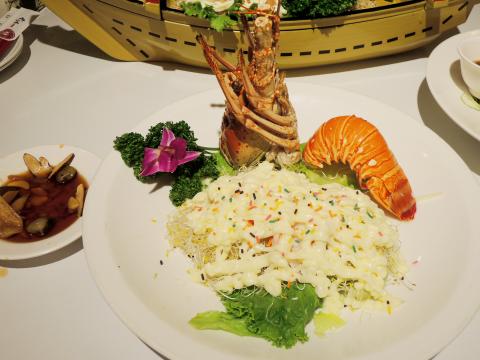
Photo: Eddy Chang, Taipei Times
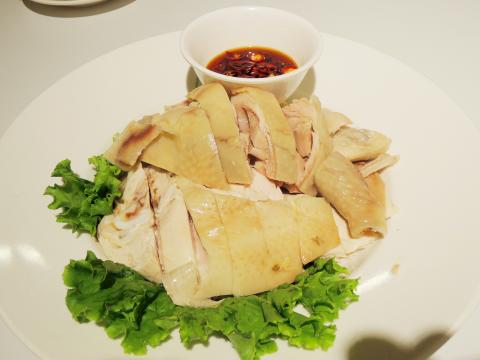
Photo: Eddy Chang, Taipei
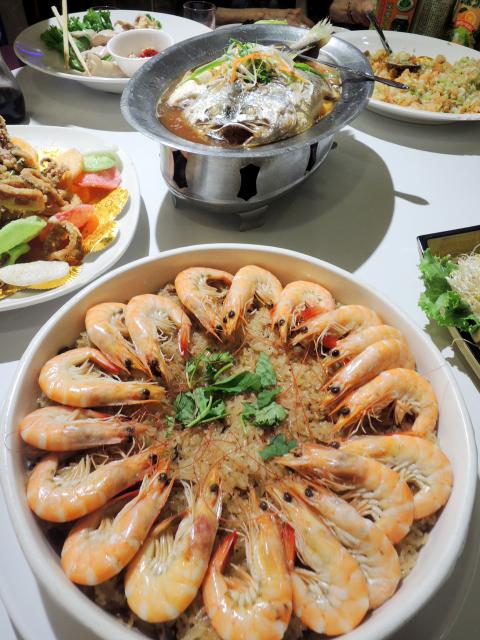
Photo: Eddy Chang, Taipei

Behind a car repair business on a nondescript Thai street are the cherished pets of a rising TikTok animal influencer: two lions and a 200-kilogram lion-tiger hybrid called “Big George.” Lion ownership is legal in Thailand, and Tharnuwarht Plengkemratch is an enthusiastic advocate, posting updates on his feline companions to nearly three million followers. “They’re playful and affectionate, just like dogs or cats,” he said from inside their cage complex at his home in the northern city of Chiang Mai. Thailand’s captive lion population has exploded in recent years, with nearly 500 registered in zoos, breeding farms, petting cafes and homes. Experts warn the

No one saw it coming. Everyone — including the Chinese Nationalist Party (KMT) — expected at least some of the recall campaigns against 24 of its lawmakers and Hsinchu Mayor Ann Kao (高虹安) to succeed. Underground gamblers reportedly expected between five and eight lawmakers to lose their jobs. All of this analysis made sense, but contained a fatal flaw. The record of the recall campaigns, the collapse of the KMT-led recalls, and polling data all pointed to enthusiastic high turnout in support of the recall campaigns, and that those against the recalls were unenthusiastic and far less likely to vote. That

The unexpected collapse of the recall campaigns is being viewed through many lenses, most of them skewed and self-absorbed. The international media unsurprisingly focuses on what they perceive as the message that Taiwanese voters were sending in the failure of the mass recall, especially to China, the US and to friendly Western nations. This made some sense prior to early last month. One of the main arguments used by recall campaigners for recalling Chinese Nationalist Party (KMT) lawmakers was that they were too pro-China, and by extension not to be trusted with defending the nation. Also by extension, that argument could be

Aug. 4 to Aug. 10 When Coca-Cola finally pushed its way into Taiwan’s market in 1968, it allegedly vowed to wipe out its major domestic rival Hey Song within five years. But Hey Song, which began as a manual operation in a family cow shed in 1925, had proven its resilience, surviving numerous setbacks — including the loss of autonomy and nearly all its assets due to the Japanese colonial government’s wartime economic policy. By the 1960s, Hey Song had risen to the top of Taiwan’s beverage industry. This success was driven not only by president Chang Wen-chi’s